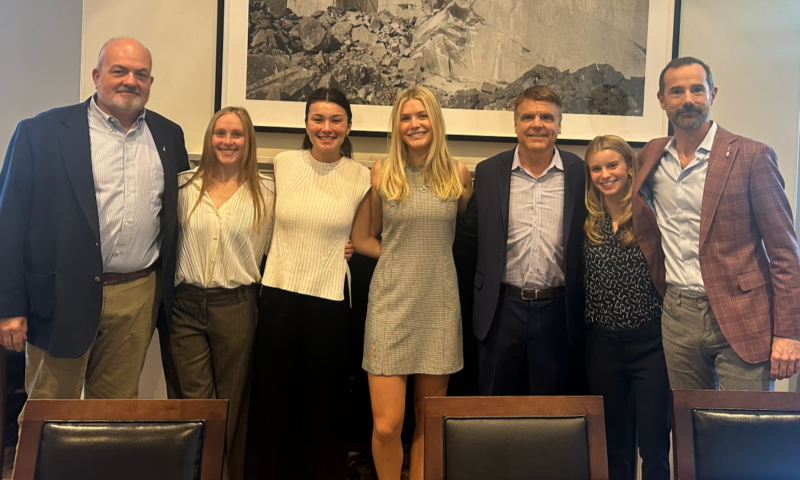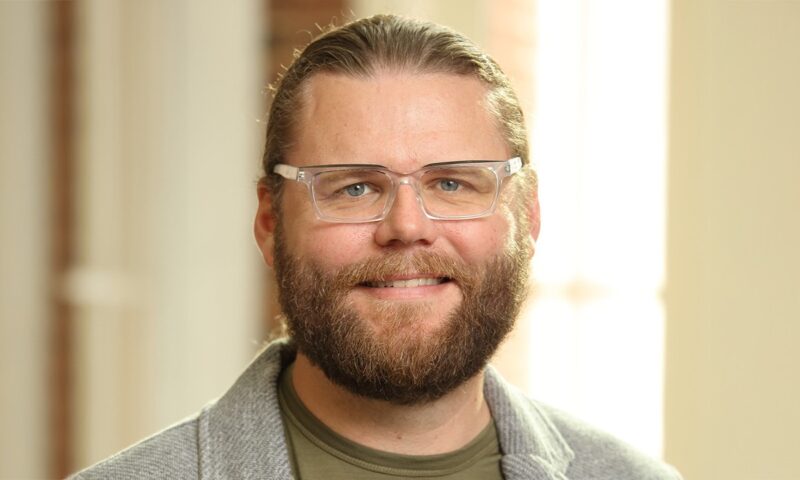Blythe Engel is passionate about mentorship. When she was growing up in San Francisco, CA, she says she was always subconsciously seeking role models and trying to emulate those she admired. Since graduating from UVA and returning to the West Coast, where she entered the workforce at Google, her need to foster positive impact through mentorship has become doubly true for her.
“I remember seeing successful sellers and employees on my floor and hoping to eventually do well enough to get the opportunity to coach the ‘Nooglers’—new employees to Google,” she says. “Now as a tenured seller, I’ve gotten the chance to officially mentor six people, and am currently managing seven direct reports, all while having a new mentor coach me on how to be a positive manager.”
Engel believes the process and responsibilities have taught her that the cycle of mentorship never ends, taking to heart the idea that it’s always important to demonstrate positive behaviors regardless of role or rank, and knowing that we can be taught and influenced by those around us as we coach others, too.
Having completed the Leadership Minor through McIntire, the Psychology and Media Studies double major was drawn to the Commerce School’s course of study to find her voice and conquer some challenging areas that were difficult for her; she formed a bridge both between her two majors and her then-future hopes for entering the job market and the real world after college.
“There was a lot of overlap, especially between Psychology and the Leadership Minor,” she recalls, noting that Psych coursework on culture and biases was often an important component of cases discussed in Comm Leadership classes as well. “I felt I was more prepared for work after graduation than many of my peers because of how my majors were enhanced by the minor,” Engel says, explaining that she also learned how to better position herself to be successful early on in her career.
Seeing Her Potential to Manage Up
Engel is without vision in her right eye, which impacts her life to a degree, but it’s something that is barely noticeable to those around her. While some may call it a setback, she’s relied on the condition to better her mindset.
“At times, my vision can get worse, and while that sounds scary, I am actually grateful for my lack of vision in a way, as it has consistently reminded me to minimize assumptions as much as possible,” she says, adding that her own challenges have served as a reminder to withhold making snap judgements of others.
In much the same way, she’s also learned to respect her own potential and leverage her power to lead. She says that her Comm Leadership courses proved to be timely and applicable to her life much earlier than she had ever predicted.
“Leveraging power shows up right away, even before you may start your role,” she says, pointing out that negotiating pay is only one example, but it also directly impacts relationships and daily interactions at work. “How to get more power, as we discussed in class, is actually ridiculously simple and can start from day one. Know the ‘right’ people, do the ‘right’ thing, and know what is going on,” Engel says. It gave her a clear path to act on, to advocate for herself, and to grow professionally while better supporting her teams and customers. “Just because I was new and learning didn’t mean my power and power potential were any less. I was the only thing standing in my way.”
She says that the Leadership Minor gave her ample opportunity to incorporate lessons directly in her life. One that stands out is the practice of managing up, a concept from her Strategic Leadership and Leadership Practicum courses.
While it initially seemed obvious at the time Engel was learning about it, she is emphatic about how thankful she remains that her professors unpacked the topic and reviewed how to properly advocate for oneself with managers. She insists the lessons set her up to succeed early in her career: “Professors [Emma] Zhao and [Paul] Seaborn detailed how keeping track and sharing your weekly wins and challenges with your manager weren’t bragging, but a record for your manager to reference when they are ready to advocate for you” in situations ranging from promotions and pay raises to simple recognition.
“Because I was clear with my intentions, I was able to get promoted within a year, and gain access to leadership opportunities I was genuinely excited about. I fully credit the minor for helping me achieve many of my short-term goals, thanks to my comfortability in managing up,” she says.
The Minor’s Major Value-Adds
Engel says that she still finds herself referencing case studies from her Strategic Leadership course in her role at Google, selling advertising to small- and medium-sized businesses, because of the sheer number of practical examples in the material that focused on the situations of entry-level employees through levels up to the C-suite. Topical examinations of power and influence, managing stakeholders, and implementing and resisting change have all aligned with what she faces day in and day out on the job.
Lessons in leadership have had a direct hand in shaping her increasing responsibilities as well. She was recently chosen to manage seven BOLD (Build Opportunities for Leadership & Development) summer interns.
“While the minor has clearly taught me concepts and strategies that I’ve already been able to apply in my early career, now that I have direct reports, I’m experiencing even more value from the Comm courses in my day-to-day,” she says, explaining that she’s reminded to set a vision and mission as a team, a valuable concept she’s taken from the Leadership Minor.
“In some respects, being a leader is kind of an ‘always-on’ role,” she explains. “Reports don’t look to leaders only for clear-cut instructions; they also study them, sometimes unconsciously, to understand values, culture, norms, and behaviors. This has shown me why it is so important to step up and be clear about the intentions and mission you have for the team, but also truly ‘walk the walk’ when it comes to those agreed-upon norms, because you can’t just deliver a mission statement and not lead by example.”
Clearly, the Leadership Minor has proven worthwhile to Engel at many turns in her early career. And while she cites intimate class sizes, robust discussions, and dedicated faculty as having been instrumental in her own successful experience, she says that the program’s real-world pertinence has been a differentiator that current UVA undergrads should seriously consider.
“Topics covered were applicable, and I genuinely have used skills we dissected in class in my job. It helped me form an idea of what I wanted to do after graduating, while also giving me enough context to truly question my surroundings,” she says, noting how easy it can be to assume that all jobs mirror the trappings of an early-career role. “That’s not the case! This minor introduced me to the expansiveness of what is included in business, and I’m thankful for that reality check, as it allowed me to truly home in on what I actually wanted, instead of simply accepting whatever I got at face value,” Engel says.
She admits that while it can feel odd to learn about how to be a leader as a student about to start a career, the minor also provided her with a concrete approach to learning how to have the most productive results from being a follower, since is the case for most recent grads starting their professional lives, and how that position can develop to take on different aspects of leadership.
“There is so much value in this minor,” she says. “These classes prepare you for the real world!”



